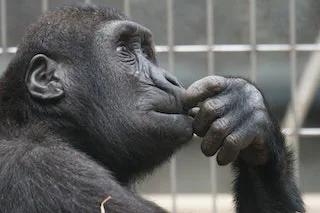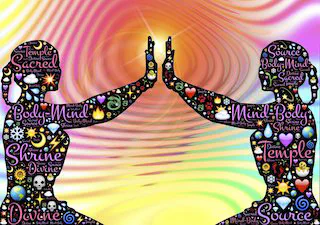
How you think creates your entire life experience
- Matthieu P.J.
- Spirituality
- November 25, 2021
Do you remember how your life was before you started thinking with words? That may seem like a strange question. By that, I mean: as a child, before you started talking, can you remember what your experience of the world was like? Chances are, you may get a glimpse of it.
If you look at young kids before they learn language, they seem blissful and curious about everything. They’re engaged in all they do and their eyes are wide open. Have you ever looked into their eyes and felt that? Although they do not speak, they know things. They have an intelligence of their own, although they do not speak to themselves in their head as adults do. They think in a different way: with imagery and it is non-verbal.
Fast forward 20 years or so, and you now have young adults who have been conditioned and formatted by the society into which they were born: their parents, teachers, friends have shaped them into what they are. They are much less engaged with life as they used to be. The bliss of being alive has subsided and left room to the stress about exams, the anxiety of landing a job, being good enough at work to keep their income and pay their rent and various bills etc. Other adults would say: “that’s real life, they are grow-up now”. Is that so? It seems that the experience of pressure, responsibilities and suffering is what we commonly consider real and reasonable.
Animals do share the aliveness and authenticity of young kids. Many people like pets because they do not lie, they simply are as they are. In a sense, animals are ’easy’. Conversely, we may find it difficult to engage with other persons because of all the intricacy of human behaviour. Most things are not straightforward in human relationships, and deep inside us we know it. That’s the societies of this early 21st century: dominated by rules, conventions and a widespread misuse of mental energy.
But what is thinking? This thing that we constantly do is rather difficult to define. To humans beings that are constantly thinking, it’s similar to asking a fish what water is.
Table of Contents
The power of the word
Thinking is an abstract process by which we conceptualise the world in which we evolve and reflect upon it using symbols. It’s all happening in the mind. And how do we think? We use ideas, concepts, that we express with words.
The use of language is the use of symbols. Words are a mere convention to represent physical objects (e.g., a house) or abstract ideas (e.g., being successful) using a written and oral forms. Words are without any value unless there is a group of people who recognise the symbols—they share the knowledge of the language. There is actually something quite extraordinary about travelling to a country from a culture so different that you cannot intuit the meaning of any word they use. People talk gibberish and that’s all right, because you can function without understanding them—and it can actually feel quite liberating because your brain is not unconsciously absorbing their conversation.
Another interesting situation is when you learn another language and reach the point where you can think using it. You will notice that each language has its own particular style and you do not think in the same way in all languages. That is because the structure of the language influences the way to articulate concepts and ideas. The grammar and sentence construction in each language makes it more or less efficient at certain styles of thinking. For example: a language can be concise and suitable for business; while another is a bit wordy but good for poetry.
Language is a fantastic—yet limited—tool
Language is elegant and allows for communication between people and society. However, language is far from perfect. In fact, it is notoriously inefficient at sharing precise concepts and ideas unless a lot of details are added—and that step is usually skipped because of how painful and time-consuming it is. The result: there are approximations made at each stage of conversion between thoughts and words, as seen in this diagram.

Everyone has got a different level of ability with the word, leading to the choice of such and such words to convey an idea to someone else using speech. The listener then has to reconstruct the concept with the words he hears. The problem is that each of us has a slightly different way to understand words. And we often make assumptions and project things onto a message whereas the information was simply not there initially—that is, in the mind of the speaker.
That causes distortions and inevitably misunderstandings. That can be fine for most of the day-to-day interactions without particular complexity or importance. But if you work in a field where the precision of language is required such as science, engineering or law you will know how much meat needs to be added to the bone to make sure that you and your contact are talking about the same thing without ambiguity. And I am not even talking about the scenario where a message is being relayed between multiple people. There’s usually a terrible degradation of the original message and its intended meaning. We even have an expression for it: Chinese whispers.
Symbols are not base reality
By the time we reach adulthood, we’ve been thinking for so long that we are completely hypnotised by the power of language. That is: we have severed our bonds with the real world that the words represent. We’ve forgotten that the excessive manipulation of symbols—by use of words in our thinking process—disconnects us from what is referred to by these symbols.
We have tens of thousands of thoughts every day. That means millions a year! That tells you how deeply ingrained the words are in our mind.
Worse, words have got a propensity of their own to attract more words: by making connections between ideas or under the influence of things we have heard or read before. That means that in our heads thoughts constantly attract more thoughts, and they are self-reinforcing. That is how we can get trapped in our own mind with an endless stream of thoughts that really gets us nowhere but uses a lot of mental energy. We listen to the voice in our head and it goes on and on and on… It’s endless.
Therefore it is healthy to remember that our thoughts are not the real thing. They only represent reality. And reality exists out there in the world—whether we have a word for it or not.
How we create our own world
Let’s get back to basics: “What is reality?”
We are interfaced with this world using our five senses. All we gather from this world is brought to our awareness through those senses. And then something extraordinary happens; something so quick and subtle that we barely notice it; something essential. We duplicate the real world (that is, all the sensorial inputs that define our experience of it) and create a carbon copy in our mind that we then edit at will. And that is where we operate most of the time: on this carbon copy of our own, disconnected from true reality. That explains why many of us live so far-off from reality: they have just drifted for too long in their own mind, without self-actualising.
If technology speaks to you, think of it as keeping an old web page opened for years without hitting the ‘refresh’ button; the content of the page (i.e. reality) has likely changed!
Have you ever noticed when you visit a foreign country how everything seems vivid and crisp the first time you go around a city for example? In that case, you have no carbon copy yet and your awareness is high because you need to process the experience. Would you say you had the same heightened awareness last time you left the house to go to the corner shop for example? Probably not. You’ve walked down the path hundreds of times already, you’ve mapped out the interesting stuff and for the rest you are not even paying attention; because you operate from your carbon copy.
Reality is what exists out there, unfiltered, unadulterated, without judgement, just as it is. But most of the time we do not operate from reality. And that is one of the roots of human suffering.
That’s what movies like The Matrix have tried to tell us about, yet many people took it too literally as a simple warning against AI and virtual reality. What if the virtual reality was something personal that each of us has constructed in his own mind since he started thinking?
The misuse of thoughts
Thinking is a double-edged sword. An amazing ability that makes us highly intelligent and capable of many achievements in the physical world. But also something that can generate unhappiness.
We create our own world whenever we process our thoughts. And we introduce approximations, take shortcuts, project desires and expectations onto the world, make assumptions. And our belief system colours our entire experience.
We also tell ourselves stories, can’t help taking sides and forming opinions about everything we hear or read—often without much research and deep reflection on it. Duality is so ingrained in us that we can barely escape it. Things are good or bad, some people are evil, that situation is shameful etc. Above all, the mind tries frantically to anticipate the future as a prediction derived from all the past experiences it has recorded. It’s in fact a fantastic machine running calculations of probabilities—endlessly. But that does not mean it needs to rule our life.
In fact, thinking is addictive and can be self-destructive when abused. We think more than is necessary to live our lives. When we think too much, we are often drawn to negativity because of the overall negativity that dominates this world. We are influenced by currents of collective thoughts without even realising it. In a sea of negativity, it is difficult to stay positive. It is possible but requires persistent efforts, sharp self-awareness and strong willpower.
We do not need to think all the time. Besides, a key spiritual practice called meditation aims at liberating ourselves from the compulsive need for thinking all the time. It requires a lot of practice and patience, but it is rewarding. But at any time, when touched by divine grace, we may be granted a moment of deep realisation. When thinking stops, when you slip into the interval between two thoughts, you can enter a different realm and experience mystical rapture. You see things for what they really are. Words are gone. Thoughts are gone. In fact, everything becomes self-evident. And the illusion of symbols collapses: beyond a word, you feel its base reality. Then, when you come back, you realise that thinking was definitely not base reality and you had been deceived—by your own mind. Remember how imperfect words are? Well, that kind of experience is beyond words because it is beyond the mind itself. It needs to be felt.
Thoughts as a tool of manifestation
Thinking is the tool of manifestation that all humans use consciously or unconsciously. Our thoughts translate into the physical world at all levels: from writing down a sentence on a piece of paper and giving it physical existence, to making important life decisions that will impact the rest of our life. Have you ever thought about it? Have you ever realised that everything man-made was once a mere thought in the mind of its creator? The car you drive, the train you board, the art masterpiece at the museum or the furnitures at home.
We are creators shaping our individual lives and the collective future. But most of us are unaware of that power: they fail to use it for all sorts of reasons, or they give it away to others. Worse: many people see their life as an endless stream of dramas without ever realising that they have orchestrated it by the poor use of their thoughts—and beneath that, the power of their word.
That may sound harsh, but that is the bitter truth. People create their own misery out of ignorance. Poor thinking leads to poor actions, poor actions call for more poor thinking… and they’re kept in that loop. We’ve all been there at some stages of our life. Can you remember a poor decision you’ve made? A painful situation? If you rewind long enough, you’ll find the original false belief, the primal mistake you’ve made: and that was in the mental realm.
Creating happiness with the power of thoughts
How we think has an essential impact on our quality of life. And what about finding happiness? It is said that “happiness is a state of mind”. Therefore happiness is generated as a result of thinking. Above all things, should we not make an effort to create peaceful and positive thoughts and emotions to support our lives? It is simple to understand but not easy to apply.
The saying about seeing the glass half-empty or half-full also gives us a clue: it’s the way we think and the choice of the stories we tell ourselves in our heads that determines our outlook on life. We must become connected to our thinking mechanisms and identify our typical patterns: those that drive us towards negativity especially. We do not really learn to think as we come into this world: it just happens and we get on with it. We learn stuff, but not necessarily how to think. It could be argued that the way we think matters more than what we learn. In fact, you may know people who received little education but who are very successful at manifesting the life they want and that’s because of the way they think.
Final thoughts
Language has a dual use: first it allows people to communicate between each other; second, it allows people to process their own thoughts. What a powerful tool!
But the thing we do most of the time—thinking—may be the thing that hurts us the most. Working with the mental representation of something can be dangerous if you forget about it. Base reality is not made of thoughts. Realising that your thoughts have misled you for a while can hurt but is liberating. It’s a necessary step on the journey to reaching a wider understanding of life and it opens new perspectives. It will also make you incredibly compassionate because you can now understand why some people act the way they do—they are stuck in their own mind.
In the West, we’ve evolved in societies that value above everything else the intellect, yet if you observe the world you will see that too much intellect does not lead to balance. As humans we also have emotions, we are bound to a physical body and we are connected to our spirit self in the subtle realms. Our mind is just a part of what we are. But that is by no means the totality of what we are. You are not your thoughts, you are not your emotions. You are so much more than any of that. And it’s not because you have a bright intellect that it automatically makes your life easy or guarantees your happiness. No matter how you look at it, it’s how you think that will determine your level of happiness: being positive, kind, loving, nurturing, compassionate, patient and forgiving—all of that with everyone and especially yourself.
We are not taught as children how to think to promote personal empowerment, and that is a terrible disservice to the entire human species. If enough people managed to master the thinking process and their mind at large, we would live in a very different type of civilisation. But who says this is not the direction we are taking right now?


